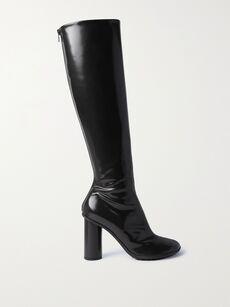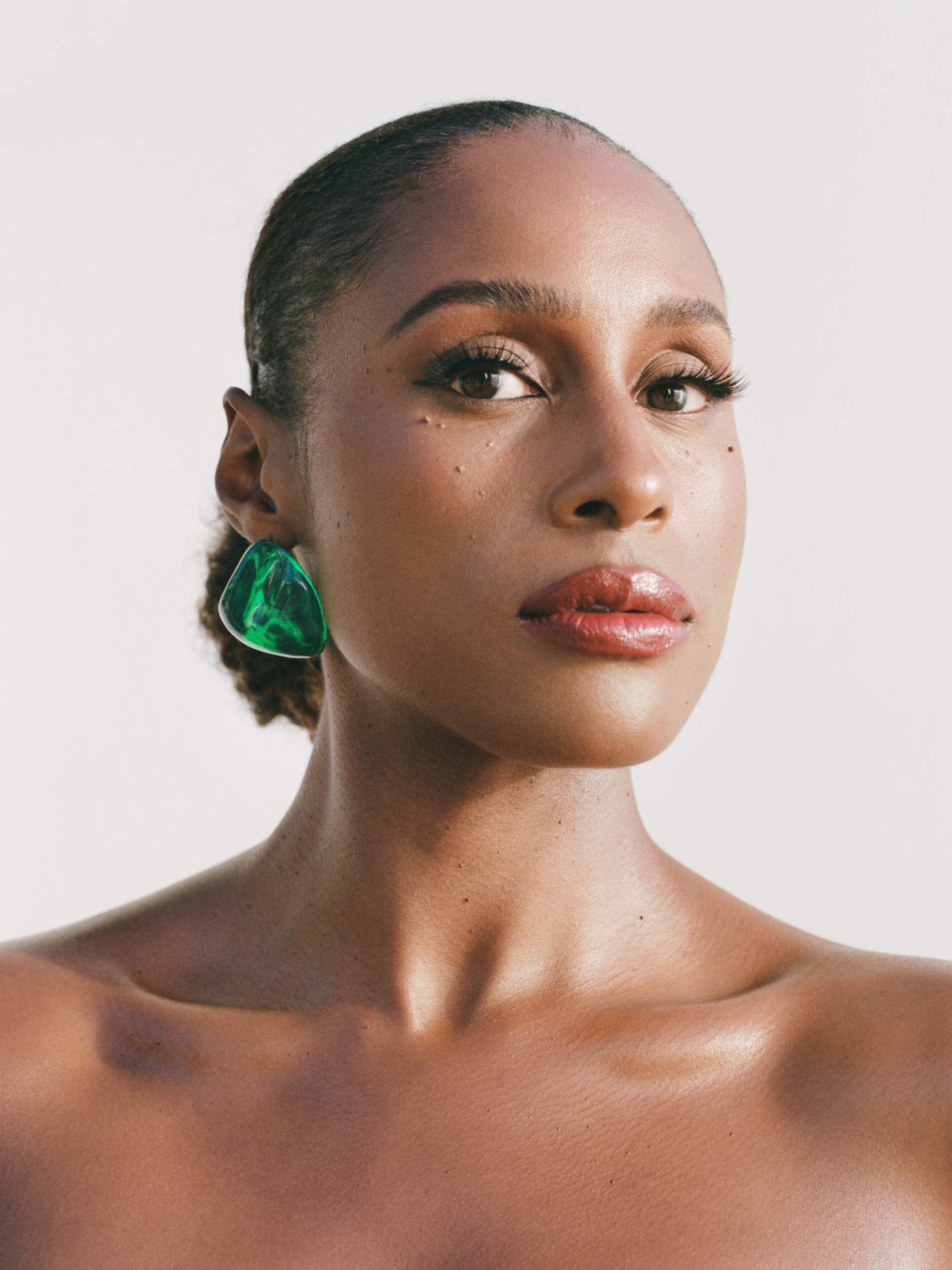Ray Of Light
With
Issa Rae

She boasts a star turn in two of the most talked-about movies of the past 12 months (Barbie and American Fiction), as well as an acclaimed screenwriting career, and now a burgeoning business portfolio to boot – but ISSA RAE is just getting started. Here, she talks to OTEGHA UWAGBA about shaking up Hollywood stereotypes, decoding her love language and finding purpose in philanthropy
Issa Rae knows how to make people laugh – and the bankable sense of humor that she’s built her career on might just be genetic. “My family is very, very funny. Every single one of my siblings [Rae has four] is hilarious,” she says, citing humor as her preferred way of connecting with people. “There’s something so romantic about sharing a sense of humor. That’s my love language.” Still, despite an easy, warm demeanor – she is quick to flash that trademark grin – one swiftly gets an idea of the formidable Hollywood entity that the writer, producer and actor has become. As we speak, Rae is sitting against the backdrop of a shelf that is stacked with awards she’s collected over her decade-plus career.
I first encountered Rae via her breakthrough web series, The Misadventures of Awkward Black Girl, back in the internet hinterlands of 2011, when web TV series felt like a brave new world to conquer. And conquer Rae did, flipping its viral success into her Emmy- and Golden Globe-nominated HBO shows Insecure and Rap Sh!t. Then there have been her standout roles in ensemble blockbusters – last year’s mega-hit Barbie, and now one of the buzziest movies of 2024, American Fiction. Joking aside, this is someone who, as her Insecure on-screen alter ego Issa Dee might put it, is about her shit.
The daughter of a Senegalese doctor and American schoolteacher, Rae, 39, grew up in Maryland and then Los Angeles – where she is now based with her husband, Louis Diame (the couple wed in the South of France in 2021) – as well as a period living in Senegal. She went on to study at Stanford, and during her time there founded a theater company focused on telling Black stories – not unlike Hoorae Media, the production company she heads up today.
“There’s something so ROMANTIC about SHARING a sense of humor. That’s my LOVE language”
With so many creative strings to her bow, not to mention businesses (Rae recently launched prosecco brand Viarae, adding it to the vegan haircare line and string of LA coffee shops she already owns), I’m curious about which of these endeavors has her most fired up for 2024. “I’m writing a couple of different projects – one for myself and one to produce and create with others – and I’ve been feeling so inspired and excited to get back at it,” she says. By ‘back at it’, she is, of course, referring to the enforced hiatus brought on by the writers’ and actors’ strikes last year; the silver lining seems to have been a renewed sense of clarity. “I’m embracing that challenge. The industry is in flux, so it’s really inspired me to focus and hone in on what stories I want to tell. I’ve been laser-focused on getting these projects up and running.”
In American Fiction – a part-satire, part-family drama that takes aim at the limiting ways the publishing industry and media treats Black writers – Rae plays the bestselling author Sintara Golden. She’s a complex character; her hit novel, We’s Lives In Da Ghetto, is a ‘hood lit’ narrative filled with negative tropes about broken families and deadbeat dads, which puts her at odds with fellow novelist Thelonious ‘Monk’ Ellison (played by Jeffrey Wright). Monk is enraged by what he views as harmful Black stereotypes being rewarded by white publishing executives.
“I found [the script] so relatable, so funny, so perfectly satirical. Because I’ve been Monk, and I remember in the Awkward Black Girl days – and even prior to that – feeling so enraged about what wasn’t being made, and being mad at who was in the spotlight at the time because I was like, ‘I know we’re so much more than what’s being presented here.’ I recognize that hunger, of just wanting your work to be seen and attacking the wrong targets.”
At the same time, Rae understands all too well the pressure of shows made by, or centering on, Black characters being held up as representative of all Black people – in part, because so few of these shows exist. “When Insecure came out, I was very clear. I was like: ‘This is not a story about all Black women. This is a very specific story.’” Rae has empathy for her American Fiction character Sintara, positioned as the film’s ‘sell-out’, and who we understand to be cynically pandering to white biases in order to get ahead.
“I completely understand it and I agree with [Sintara’s] point that [Monk’s] ire should be directed towards the white audiences that put very specific work about Black people on this pedestal, as opposed to more diverse representations of Blackness. I don’t think it’s a secret that many white audiences and critics tend to reward traumatizing depictions, or their own biased perceptions of what Blackness is. It’s frustrating.” She agrees emphatically with my suggestion that shows made by or about Black people often have to be outré or foreground racial trauma, rather than having the quiet emotional stakes other demographics are afforded. “If this were a movie just about that Black family, I don’t know that it would get praised as much as it has been. Those kinds of movies are hard to get made.”
“I’ve had FAITH in the talent I have to CAPTIVATE a very specific audience – and I think about that AUDIENCE constantly”
And yet, for all its bawdy humor and occasional surrealism, Insecure did trade in exactly that: quiet emotional stakes; depicting ordinary Black women in all their messiness, complete with dating woes, professional struggles and friendship fallouts. Getting it on air was far from an overnight process, though. Having gained industry recognition via Awkward Black Girl, Rae soon got a call from TV titan Shonda Rhimes, who offered her a golden opportunity to produce a comedy pilot.
“And I didn’t do well!” she confesses, matter-of-fact – after all, Rae had never written a TV show before. “[Shondaland – Rhimes’ production company] was amazing, but I didn’t do well with the network process. I didn’t understand the note-taking and how to be edited while still keeping your voice, because I didn’t really know what my voice was. I was trying to just please and make something that Shondaland would be proud of. I didn’t know what I wanted to say.” The pilot wasn’t picked up and, for a while, Rae was convinced that she’d blown her only chance of making it as a TV writer – a long-held aspiration. “Then, a couple of months later, HBO called to see if I wanted to pitch them a show.” That show would end up being Insecure. “It was through a lot of misses that I got this opportunity.”
With setbacks and disappointments along the way, was there ever a time she considered calling it quits with TV? “I’ve had faith in the talent I have to captivate a very specific audience – and I think about that audience constantly,” she says. Still, Rae puts at least some of her drive and determination down to naivety, describing herself as “stupidly optimistic” early on in her career.
“This is FUN… But at some point, it’ll feel like not ENOUGH – and I want to be ABLE to do more”
The TV landscape is radically different to the one in which she rose more than a decade ago, and, in past interviews, Rae has expressed concern about how industry changes – the creeping dominance of streamers, the influence of profit-chasing Wall Street investors – might lead to greater homogeneity, and fewer Black stories being greenlit.
“It’s already happening,” she says. “You’re seeing so many Black shows get cancelled, you’re seeing so many executives – especially on the DEI [diversity, equity and inclusion] side – get canned. You’re seeing very clearly now that our stories are less of a priority.” Indeed, not long after we speak, Variety publishes a study demonstrating the pledges that major studios had made in 2020 to hire a more diverse pool of filmmakers haven’t come to fruition, describing them as largely performative. “I am pessimistic, because there’s no one holding anybody accountable – and I can, sure, but also at what cost? I can’t force you to make my stuff. It’s made me take more steps to try to be independent down the line if I have to.”
As one of Hollywood’s most talented creators, Rae’s future ambitions may come as a surprise. “I want, in 10 years’ time, to be transitioning towards service,” she tells me. In fact, when we speak, Rae is fresh from a trip to Senegal. Though she’s coy about details, she hints at having filmed something tied to that desire to bolster her philanthropic endeavors. “This is fun,” she says, referring to her Hollywood career, “but at some point, it’ll feel like not enough – and I want to be able to do more.”
Issa Rae isn’t going anywhere just yet, though. “This year is really about firing on all cylinders. That’s what I’m excited about,” she says, adding that she’s “barely scratched the surface” in terms of wish-list collaborators – hence increasingly opting for ensemble projects as a ‘cheat code’ to allow her to work with more of them at once. Because, no matter what she does, whether it’s acting, writing, producing, or building a business, Rae is determined to enjoy herself along the way.
“I really just want to have a good-ass time with the people I love.” And who can argue with that?
American Fiction is in US movie theaters now, and from February 2 in the UK
SHOP THE SHOOT
9 items
 BOTTEGA VENETALatex knee boots€1,510.00View Product DetailsSelect a SizeEU 34EU 35EU 36EU 37EU 38 - low stockEU 39 - out of stockEU 40 - low stockEU 41 - out of stockEU 42
BOTTEGA VENETALatex knee boots€1,510.00View Product DetailsSelect a SizeEU 34EU 35EU 36EU 37EU 38 - low stockEU 39 - out of stockEU 40 - low stockEU 41 - out of stockEU 42 BALENCIAGAMega gold-tone hoop earrings
BALENCIAGAMega gold-tone hoop earrings THE ROWLace-up knotted satin sandals€565.00View Product DetailsSelect a Size36 - out of stock36.5 - out of stock37 - out of stock37.5 - out of stock38 - out of stock38.5 - out of stock39 - out of stock39.5 - out of stock40 - out of stock41 - out of stock42 - out of stock
THE ROWLace-up knotted satin sandals€565.00View Product DetailsSelect a Size36 - out of stock36.5 - out of stock37 - out of stock37.5 - out of stock38 - out of stock38.5 - out of stock39 - out of stock39.5 - out of stock40 - out of stock41 - out of stock42 - out of stock LE MONDE BERYLLeather-trimmed mesh Mary Jane ballet flats€225.00View Product DetailsSelect a Size35 - out of stock36 - out of stock37 - out of stock38 - out of stock39 - out of stock4041 - out of stock42 - out of stock
LE MONDE BERYLLeather-trimmed mesh Mary Jane ballet flats€225.00View Product DetailsSelect a Size35 - out of stock36 - out of stock37 - out of stock38 - out of stock39 - out of stock4041 - out of stock42 - out of stock




